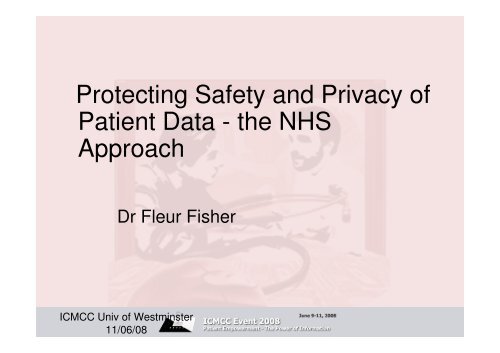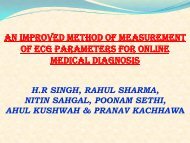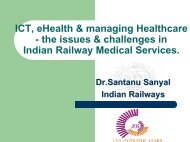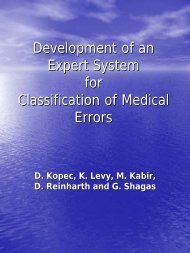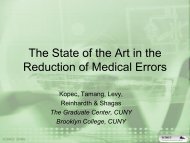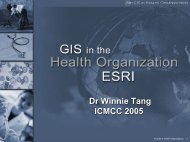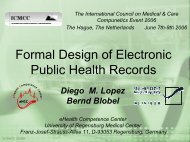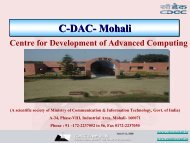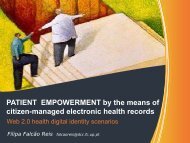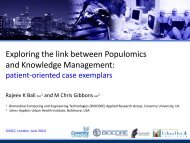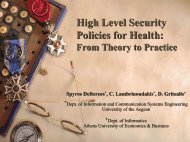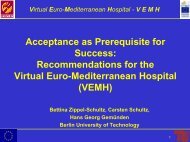Fleur Fisher - ICMCC
Fleur Fisher - ICMCC
Fleur Fisher - ICMCC
Create successful ePaper yourself
Turn your PDF publications into a flip-book with our unique Google optimized e-Paper software.
Protecting Safety and Privacy of<br />
Patient Data - the NHS<br />
Approach<br />
Dr <strong>Fleur</strong> <strong>Fisher</strong><br />
<strong>ICMCC</strong> Univ of Westminster<br />
11/06/08
“Into whatever houses I enter, I will go for<br />
the benefit of the sick and will abstain form<br />
every voluntary act of mischief and<br />
corruption……..<br />
…………Whatever I see or hear, in the life<br />
of men, which ought not to be spoken of<br />
abroad, I will not divulge, as reckoning all<br />
such should be kept secret.”<br />
Hippocrates 5 th century BC 1<br />
<strong>ICMCC</strong> Univ of Westminster<br />
11/06/08
“Every case committed to a physician should<br />
be treated with attention, steadiness and<br />
humanity”<br />
Thomas Percival “Medical Ethics”, 1803 2<br />
<strong>ICMCC</strong> Univ of Westminster<br />
11/06/08
Autonomy as the ability and the freedom to<br />
make the choices that shape our lives, is<br />
quite crucial in giving to each life its own<br />
special and peculiar value”<br />
(Harris, J. Law and regulation of retained organs : the<br />
ethical issues. Legal Studies 2002;22 : 527-549)<br />
<strong>ICMCC</strong> Univ of Westminster<br />
11/06/08
Declaration of Geneva (modernised Hippocratic<br />
Oath)<br />
The version agreed at the 35 th World Medical<br />
assembly in Venice in October 1983 this<br />
includes the statements………<br />
• “The health of my patient will be my first<br />
consideration.<br />
• I will respect the secrets which are confided in<br />
me even after the patient has died”<br />
<strong>ICMCC</strong> Univ of Westminster<br />
11/06/08
Declaration of Helsinki ……Includes in its 12 Basic Principles<br />
6. Every precaution should be taken to<br />
respect the privacy of the subject and to<br />
minimize the impact of the study on the<br />
subject’s physical and mental integrity and<br />
on the personality of the subject.<br />
<strong>ICMCC</strong> Univ of Westminster<br />
11/06/08
Declaration of Helsinki ……Includes in its 12 Basic Principles<br />
9. In any research in human beings, each<br />
potential subject must be adequately<br />
informed of the aims, methods, anticipated<br />
benefits and potential hazards of the<br />
study….<br />
…….The physician should then obtain the<br />
subject’s freely-given informed consent,<br />
preferably in writing<br />
<strong>ICMCC</strong> Univ of Westminster<br />
11/06/08
Identifiable<br />
Health<br />
information<br />
= The virtual<br />
naked patient<br />
<strong>ICMCC</strong> Univ of Westminster<br />
11/06/08
Unconsented<br />
access to<br />
identifiable<br />
health data<br />
= Data Rape<br />
<strong>ICMCC</strong> Univ of Westminster<br />
11/06/08
Unconsente<br />
d datasharing<br />
of<br />
identifiable<br />
health<br />
information<br />
=<br />
Data Rape<br />
<strong>ICMCC</strong> Univ of Westminster<br />
11/06/08
Modern Healthcare Practice….<br />
“Providing modern healthcare is an<br />
information-intensive enterprise”<br />
Kluge<br />
“Medicine is no longer the sacred dyad of<br />
one doctor, one patient”.<br />
Ashcroft<br />
<strong>ICMCC</strong> Univ of Westminster<br />
11/06/08
Autonomy<br />
Human beings want above all to protect the<br />
sacred, the intimate, the fragile , the<br />
dangerous and the forbidden.<br />
With no capacity for keeping secrets and<br />
choosing when to reveal them, human<br />
beings…..<br />
…….lose their sense of identity and every<br />
shred of autonomy<br />
(Bok S: Secrets OUP 1982 p281-2)<br />
<strong>ICMCC</strong> Univ of Westminster<br />
11/06/08
Informed Consent<br />
necessary for :<br />
• Treatment<br />
• Investigation<br />
• Screening<br />
• Research<br />
• Data-sharing<br />
<strong>ICMCC</strong> Univ of Westminster<br />
11/06/08
Theory :<br />
Successful specification of IT systems<br />
engage with<br />
• Users (health professionals)<br />
• Subjects (patients)<br />
So that their needs are built into the<br />
technical specification<br />
<strong>ICMCC</strong> Univ of Westminster<br />
11/06/08
IN NHS PRACTICE…….<br />
• No public debate feeding into specification<br />
• No debate with the health professions<br />
• Strict secrecy for professionals involved in<br />
specification<br />
• No parliamentary debate<br />
<strong>ICMCC</strong> Univ of Westminster<br />
11/06/08
NHS Practice<br />
• OBS for the National Care Record<br />
Service was confidential<br />
• Finally revealed after sustained 2 yr<br />
campaign by Computer Weekly<br />
• First public mention of National Data Spine<br />
“patients may not dissent”<br />
<strong>ICMCC</strong> Univ of Westminster<br />
11/06/08
Data sharing:<br />
the<br />
Rohypnol of government !?<br />
<strong>ICMCC</strong> Univ of Westminster<br />
11/06/08
Data Security Act 1998<br />
-governs the processing of data that<br />
identify living individuals<br />
-incorporates other areas of law on<br />
confidentiality, by requiring that data<br />
processing is “lawful”<br />
- 8 data protection principles at heart of<br />
the Act<br />
<strong>ICMCC</strong> Univ of Westminster<br />
11/06/08
Data must be:<br />
1. fairly and lawfully processed<br />
2. processed for limited purposes<br />
3. adequate, relevant and not excessive<br />
4. accurate<br />
5. not kept for longer than is necessary<br />
6. processed in line with data subject’s rights<br />
7. secure<br />
8. not transferred to countries without adequate<br />
protection<br />
<strong>ICMCC</strong> Univ of Westminster<br />
11/06/08
Disclosures required by law of<br />
identifiable personal health data<br />
*Public health – notifiable diseases<br />
*Health and Safety Legislation<br />
(deaths, major injuries, accidents 3/7+ sick)<br />
*Abortion (pseudonymised data now)<br />
Patient’s consent not necessary, but<br />
patient should be told of fact and purpose of<br />
disclosure<br />
<strong>ICMCC</strong> Univ of Westminster<br />
11/06/08
Human Rights Act 1998<br />
Article Eight : Right to respect for<br />
private and family life<br />
-personal data<br />
- sexuality<br />
<strong>ICMCC</strong> Univ of Westminster<br />
11/06/08
Health and Social Care Act<br />
2001<br />
(applies England and Wales only)<br />
Section 60<br />
Introduced as a temporary measure<br />
only<br />
to permit disclosure for purposes such as<br />
disease registries where the electronic<br />
systems that collected the information<br />
could not accommodate patient refusal<br />
<strong>ICMCC</strong> Univ of Westminster<br />
11/06/08
• Anonymised Information<br />
Source Informatics case 1998<br />
Court of Appeal held that<br />
patient confidentiality is not breached when<br />
patient identity is protected<br />
- ie competently anonymised<br />
<strong>ICMCC</strong> Univ of Westminster<br />
11/06/08
Electronic Care<br />
Record Service<br />
Data Spine<br />
Summary Care Record<br />
Detailed Care Record<br />
<strong>ICMCC</strong> Univ of Westminster<br />
11/06/08
Greenhalgh Report :<br />
Qualitative research to document views of<br />
patients and public to<br />
* Uploading summary care record to<br />
national data spine<br />
* Healthspace – enabling patient to view<br />
their SCR via internet<br />
BMJ 2008 dol 10.1136/bmj.a114<br />
<strong>ICMCC</strong> Univ of Westminster<br />
11/06/08
Greenhalgh Review of SCR<br />
Conclusion : that presumed consent<br />
acceptable for adding data to spine, but<br />
patient to consent for every access<br />
(?practicality<br />
?patient competence when actually worried/unwell)<br />
<strong>ICMCC</strong> Univ of Westminster<br />
11/06/08
Major concerns re<br />
privacy of young<br />
people’s identifiable<br />
data<br />
<strong>ICMCC</strong> Univ of Westminster<br />
11/06/08
• Childrens’ Databases (0-18)<br />
(Every Child Matters- white paper)<br />
• DNA Database- holds 200,000<br />
samples from children not charged<br />
with any offence<br />
• New : proposed new schools targets<br />
for “wellbeing”- DCSF suggest they<br />
include pregnancies and drug abuse<br />
<strong>ICMCC</strong> Univ of Westminster<br />
11/06/08
Suggest you read<br />
“Medical Science Under<br />
Dictatorship”<br />
Leo Alexander MD<br />
New England Journal of Medicine July 14 1949<br />
Google Alexander and you will find this<br />
seminal article<br />
<strong>ICMCC</strong> Univ of Westminster<br />
11/06/08
Remember<br />
• that democracy is a fragile plant<br />
• and that NO government is<br />
friendly to all its citizens!<br />
• Doctors are answerable both to<br />
the individual patient and their<br />
regulatory body<br />
<strong>ICMCC</strong> Univ of Westminster<br />
11/06/08
The underlying principle of the patient/physician<br />
relationship is underpinned by medical ethics,<br />
which may be supported or undermined by<br />
legislation.<br />
Role of national medical associations is:<br />
*constantly to scan proposed legislation,<br />
*to campaign vigorously to protect the<br />
doctor/pt relationship and<br />
*the dignity, privacy & autonomy of the<br />
patient<br />
<strong>ICMCC</strong> Univ of Westminster<br />
11/06/08
Useful Websites<br />
• GMC<br />
• BMA<br />
• FIPR (Foundation for Information Policy<br />
Research<br />
• Privacy International<br />
• ARCH (Action on Rights for Children)<br />
• Tboo (The Big Opt Out)<br />
<strong>ICMCC</strong> Univ of Westminster<br />
11/06/08
Dr <strong>Fleur</strong> <strong>Fisher</strong><br />
email : fishermed@hotmail.co.uk<br />
<strong>ICMCC</strong> Univ of Westminster<br />
11/06/08


